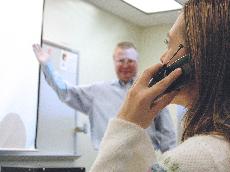 Professors, such as Dr. Russell Proctor, are prohibiting cell phone use in class.
Professors, such as Dr. Russell Proctor, are prohibiting cell phone use in class.In school and business settings alike, cell phone etiquette violators seem to be an increasing problem. Northern Kentucky University is no exception.
Teachers on campus are enacting rules regarding cell phones into their syllabi. Many simply ask for the cell phones to be turned off when entering the classroom. However, sometimes even that isn’t enough, recalled English professor Andrew Miller, describing how a student answered a cell phone in class when her child called, instead of going into the hallway.
However, text messaging is the biggest issue, Miller said.
“People sit in the back corner and they think you can’t see them,” Miller said about classroom “text-ers.”
Communication professor Dr. Russell Proctor, changed the cell phone policy on his syllabus this semester just because of text-ers. Proctor said people are becoming “alarmingly good” at texting; to the point where they can do it without looking.
Proctor’s new cell phone policy states to turn the phone off and put it in your pocket, backpack or purse, keeping it out of sight.
“The world can live without you for 50 minutes,” Proctor said.
Both Proctor and Miller said texting is not only an annoyance, but also a security issue. With multimedia cell phones that are able to get online, take pictures and text, cheating has become an issue in some instances.
When students get out of class, usually the first thing they do is pull out their cell phone, according to Miller.When they do, neither conversations nor their volume seem to have a limit.
“I actually moved my office because of students talking in the hallway,” Miller said.
“Students usually don’t think about offices.”
“You can’t not listen when it’s coming right at you,” Miller said about private conversations in public hallways. He said these private conversations made public are not limited to the hallways; they’re in the restrooms as well.
Miller recalled seeing a student using the urinal in Founders Hall while talking to someone he referred to as “Butterfly.”
“I was surprised one of the two of them couldn’t wait,” Miller said. “It takes multi-tasking to a whole new level.”
Through all this negativity about cell phones, Proctor made it clear that he did understand the utility of cell phones.
“I’m not anti-cell phones, just anti-cell phone rudeness,” Proctor said. Cell phone users are unaware of and oblivious to their own rudeness, he said. “I don’t think cell phones are a necessity. They are a convenience, as well as an inconvenience.”
Amanda Adams, a junior nursing major transfer student from a college in Arkansas, believes cell phones in class can be an annoyance as well. “It’s distracting and rude to the professor who is trying to teach those paying students what they’ve come to learn,” Adams said. She said if someone called her, it would go to her voicemail and it could wait until class was over.
Danielle Mazor, a sophomore biology major, discussed a time her history teacher told a student to leave for texting. “People wonder what the other person is talking about and it distracts them and the teacher,” Mazor said. “It is just like passing notes.”
Proctor offered the following advice for cell phone users: Pay attention to the volume of your voice, turn the phone off in public situations, realize the cell phone is a tool and not a necessity and be considerate of others.

